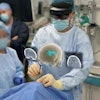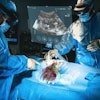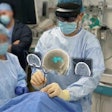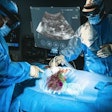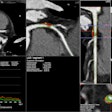Wednesday, December 4 | 10:30 a.m.-10:40 a.m. | SSK14-01 | Room E353A
In this poster presentation, researchers from France will discuss the potential benefits of a new interventional radiology technique that uses augmented reality (AR) and artificial intelligence (AI) to guide percutaneous vertebroplasty.The group from Strasbourgh University Hospital developed its AR and AI image-guided technique to improve the accuracy and safety of percutaneous vertebroplasty. The AR setup consisted of four cameras connected to a C-arm with a flat-panel digital detector.
To test the technique, the researchers evaluated the outcomes of percutaneous vertebroplasty procedures performed on 100 patients who had a vertebral compression fracture using either a combination of AR and AI to guide the procedure or standard fluoroscopy.
They found that image guidance with AR and AI was associated with a statistically significant increase in operating time, compared with fluoroscopy (p = 0.001). On the other hand, the AR and AI approach allowed for statistically significant decreases in radiation dose (p = 0.019).
Overall, AR and AI-guided percutaneous vertebroplasty appears to be feasible, accurate, and safe, lowering patient radiation exposure compared with standard fluoroscopic guidance, Drs. Piere Auloge and Roberto Cazzato, PhD, told AuntMinnie.com.
"This first clinical study using the augmented reality and artificial intelligence approach for percutaneous vertebroplasty may help change the future of image guidance," they said.
